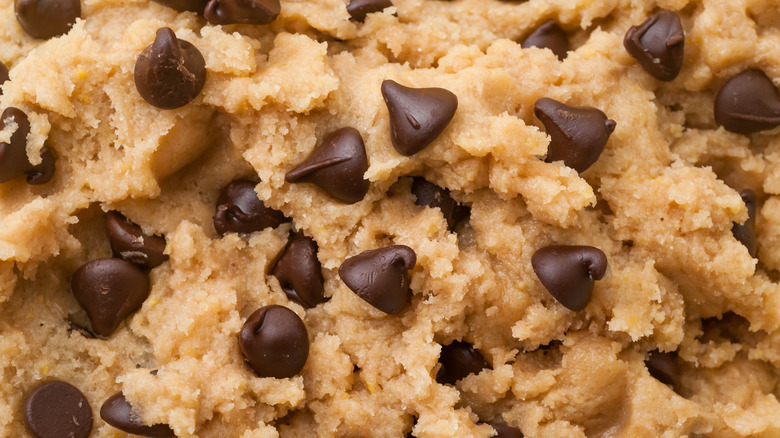The Types Of Cookie Dough You Should Never Freeze
Baking and eating delicious homemade cookies is a great way to bring some sweetness into your life. While the holiday season is an excellent time to work on your cookie-baking techniques, baking cookies should be enjoyed year-round, even during the summertime.
Even though cookies are an incredibly simple dessert, you shouldn't underestimate the power of a good ol' cookie. According to The Nibble, there are ten different types of cookies, including bar cookies, drop bookies, filled cookies, fried cookies, molded cookies, no-bake cookies, pressed cookies, refrigerator cookies, rolled cookies, and sandwich cookies. With all of these varieties, there are literally endless recipes to try for each different type, allowing you to master the art of making the perfect cookie dough.
One of the benefits of making your own cookie dough is being able to freeze and use it later. However, this largely depends on the type of cookie dough you're working with. Not all cookie dough can withstand freezing and thawing while upholding its quality. There are actually some cookie doughs that you really shouldn't freeze, that is, if you want good-tasting cookies.
It depends on the type of cookie dough
Not all cookie dough is the same, and we're not even talking about how they taste and look. Depending on the type of cookie, the way the dough is made affects the overall taste and how it's baked. While living in a world where all cookie dough could be frozen and used months later to make cookies would be great; unfortunately, we don't.
According to Sally's Baking Addiction, you should avoid freezing any cookie dough that is delicate or more liquid based. Think of macarons, pizzelles, madeleine, Florentine, and fortune cookie dough. These don't hold up well in the freezer, and even if you thaw them, they won't bake as well. These cookies usually require a fresh cookie dough batter to be baked successfully.
Cookie dough with a higher proportion of fat or butter is best for freezing. This mostly includes any kind of drop cookie dough, including chocolate chip cookies, oatmeal cookies, and peanut butter cookies. You can also freeze shortbread, slice-and-bake, and cut-out cookie dough (via Southern Living). To successfully freeze slice-and-bake cookies for up to three months, store them in the freezer after wrapping the cookie dough "log" in plastic wrap and then in a freezer bag. You can simply take it out and thaw it at room temperature for an hour or two in the refrigerator before slicing and baking. Keep in mind that once you defrost and thaw your slice-and-bake dough log, you shouldn't refreeze it.
You can also freeze fully-baked cookies
Surprisingly enough, you don't just have to freeze the cookie dough in order to keep them around for a longer period. According to Food Network, you can actually freeze fully-baked cookies if stored properly. To do this, bake your cookies and allow them to cool completely. Next, line a baking sheet with wax paper, which can help provide a protective and nonstick layer to prevent the cookies from sticking to the sheet. Finally, lay out your cookie and freeze them. You can also put the cookies in a freezer-safe plastic bag and line wax paper between individual cookies to prevent them from sticking together. Using a tupperware or harder-shelled container will help prevent the frozen cookies from crumbling too much.
When you want to enjoy one of your pre-baked cookies, simply take a couple out and place them on your counter to thaw at room temperature before eating. With this method, you'll be able to freeze a variety of fully-baked cookies, including biscottis, sugar cookies, and even brownies.


